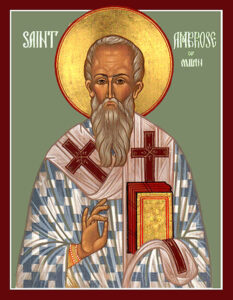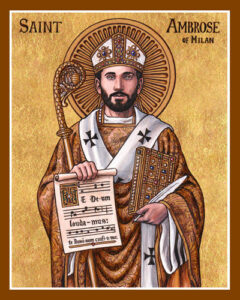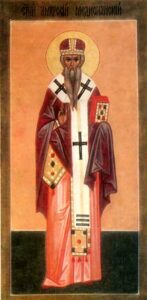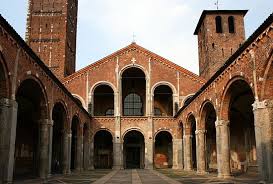St Ambrose, Bishop of Milan – Dec 7

St. Ambrose, (Latin: Aurelius Ambrosius) Bishop of Milan, was a theologian, and one of the most influential ecclesiastical figures of the 4th century, in the western world. He was trained in rhetoric and law and was famous as a preacher and champion of orthodoxy especially against the Arians. He was a strong advocate of monasticism, writing on asceticism, and also interpreting Eastern theology for the West.
He was born in the year 339/340 into the family of the Roman prefect of Gaul (now France). This great holy father was of eminent birth. His father was the high ranking, imperial deputy (praetorian prefect) of Gaul and Spain and was a pagan by faith, but his mother was a Christian. Even in his childhood, still in the cradle there appeared presentiments and foreboding of his great future. Once, bees covered the face of the sleeping infant. They flew in and out of his mouth, leaving honey on his tongue. Soon they flew away so high that they could no longer be seen. Ambrose’s father said that the child would become something great when he reached manhood. And further while still a child, he extended his hand and spoke prophetically: “Kiss it, for I will be a bishop”.

In his late 20s he was employed in legal work at the imperial court. After his father’s death, brilliant and well-educated, he was made a provincial Governor in 375 and took up residence in Milan. the emperor appointed him as his representative and civil governor, in the province of Liguria, of which Milan was the chief city. Ambrose was serving as the Roman governor of Ameillia-Liguria in Milan when he was unexpectedly made Bishop of Milan in 374 by popular acclamation. When the bishop of Milan died, a great dispute arose between the Orthodox Christians and the Arian heretics concerning the election of a new bishop. In those days, the Arian heresy was still dividing the Church, despite its repudiation at the Council of Nicaea in 325. When the time came to elect a new Bishop in Milan, the Orthodox and Arian parties were so divided that they could come to no agreement on a new Bishop.
At that moment, a child at its mother’s bosom exclaimed: “Ambrose for bishop!” All the people took this as the voice of God, and unanimously elected Ambrose as their bishop, contrary to his will. Ambrose was baptized, passed through all the necessary ranks and was consecrated to the episcopacy, all within a week. He dispersed all his possessions, money and property for the adornment of churches, the upkeep of orphans and the poor, and he devoted himself to a strict ascetic life. Ambrose entered the Church to maintain order, this being his duty. As bishop, he took a firm position against Arianism and attempted to mediate the conflict between the emperors Theodosius I and Magnus Maximus.

Saint Ambrose was also a reformer of Church singing. He introduced antiphonal singing, along the Eastern or Syrian form into the Western Church, which became known as ‘Ambrosian Chant’ a style of chanting in which one side of the choir responds alternately to the other. He also composed twelve hymns which were used during his lifetime, including Advent hymn (Veni redemptor gentium). Saint Ambrose, by teaching, preaching and writing, brought countless pagans to the Faith. His most famous convert was St Augustine of Hippo, who became his disciple and eventually a bishop. Ambrose’s many theological and catechetical works helped greatly to spread the teaching of the Greek fathers in the Latin world. He wrote many glorious antiphonal hymns which were once some of the gems of the Latin services. Ambrose’s as bishop played a role in three important aspects: the quality of his thought as a Christian intellectual, his role in the final phase of the Arian controversy, and his impact upon the relations between Church and Empire.
As bishop, Ambrose strengthened the Orthodox Faith, suppressed the heretics, adorned Churches, spread the Faith among the pagans, wrote many instructive books, and served as an example of a true Christian and a true Christian shepherd. He composed the famous hymn “We Praise Thee, O God.” This glorious hierarch, whom men visited from distant lands for his wisdom and sweetness of words, was very restrained, diligent and vigilant. He slept very little, labored and prayed constantly, and fasted every day, except Saturday and Sunday. Therefore, God allowed him to witness many of His miracles and to perform miracles himself. Meek toward lesser men, he was fearless before the great.
He reproached Empress Justina as a heretic, cursed Maximus the tyrant and murderer, and forbade Emperor Theodosius to enter a Church until he had repented of his sin. Once, putting down an uprising in Thessalonica, the Emperor Theodosius punished the city by ordering the massacre of thousands of its residents. When the Emperor later visited Milan and came to the Cathedral to attend the Liturgy, Bishop Ambrose stopped him at the door, condemned his crime before all the people, forbade him entrance to the church and excommunicated him for eight months. The emperor went away weeping, and submitted in humility to the Church’s discipline. When he returned after long penance to be restored to Communion, he went into the sanctuary along with the clergy, as had been the custom of the Emperors since Constantine the Great. But again, the holy Ambrose humbled him in the sight of all the people, saying “Get out and take your place among the laity; the purple does not make priests, but only emperors.” For him there was no difference between emperor and commoner. Though he released Theodosius from the penance, the saint would not permit the emperor to commune at the altar, but compelled him to do public penance. Theodosius left without protest, took his place among the penitents, and never again attempted to enter the sanctuary of a church. However, when the Emperor died, it was Bishop Ambrose who preached his funeral eulogy. He also refused to meet with Eugenius, the tyrannical and self-styled emperor. God granted this man, so pleasing to Him, such grace that he even raised the dead, drove out demons from men, healed the sick of every infirmity, and foresaw the future.

Western Christianity identified Ambrose as one of its four traditional Doctors of the Church. He is considered a saint by the Catholic Church, Eastern Orthodox Church, Anglican Communion, and various Lutheran denominations, and venerated as the patron saint of Milan. Ambrose died peacefully in the year 397. The repose of Saint Ambrose, who departed to the Lord on the night of Holy Week, was accompanied by many miracles. His relics still rest in the basilica in Milan.

0 Comments